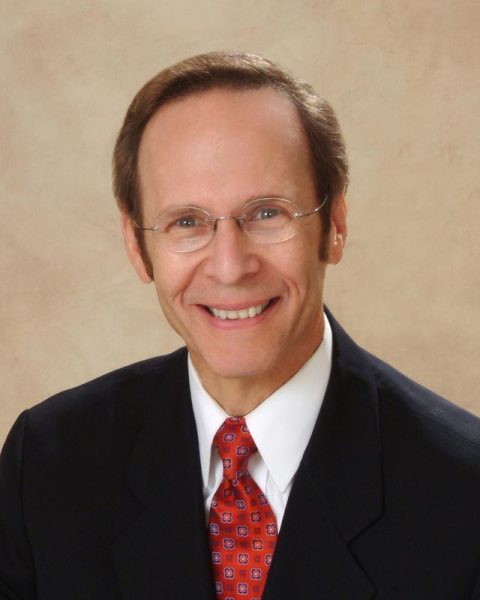A doctor and medical educator discussed medical practice and ethics during the Holocaust and warned against recreating them in modern medicine at a seminar to commemorate International Holocaust Remembrance Day Jan. 27.
Dr. Sheldon Rubenfeld (MED ’71), who serves as a clinical professor of medicine at Baylor University, addressed the violations of medical ethics and practice of eugenics during the Holocaust, as well as antisemitism in modern medicine. Georgetown University’s Kennedy Institute of Ethics, which operates as a bioethics think tank and research center, and the Georgetown University Medical Center’s Pellegrino Center for Clinical Bioethics, a bioethics center focused on clinical application, hosted the seminar.

Rubenfeld said the Hippocratic Oath, the common oath taken by medical professionals, was in line with Judeo-Christian ideals that emphasize the extension and protection of an individual’s life.
“Christianity picked up on the Hippocratic Oath, so much so that it transmitted over the next two millennia to the 20th century,” Rubenfeld said during the event. “It took what was in the Hebrew Bible, it took what was in the Hippocratic Oath and we have what some people call Judeo-Christian Hippocratism.”
Rubenfeld added that Adolf Hilter’s regime distorted the doctor-patient relationship typical under Hippocratism, which emphasizes care for the individual patient, recentering it around the Volkskörper, a term used by Nazis to describe the German national body.
“He took the Judeo-Christian Hippocratic doctor-patient relationship and transformed it into a secular state-Volkskörper relationship,” Rubenfeld said. “Now the doctor is the state, in this case the state in the image of Hitler, and the patient is no longer an individual sitting in front of the doctor — It’s now the German people.”
Volkskörper is used to identify Germany’s ethnic body politic, which took on an antisemitic definition by the end of the 19th and throughout the 20th century.
Rubenfeld said the Nazis taught this line of antisemitic medical ethics in their medical schools, promoting antisemitic eugenics, the practice and study of engineering a population to promote socially desirable traits, as morally correct.
“The Nazis not only were doing horrible things, they believed they had the moral high ground — they believed they were behaving ethically,” Rubenfeld said. “That’s what the transformation of the Hippocratic oath enabled them to do.”
Rubenfeld said eugenics was central to the German medical ethic and was put into practice through sterilization, euthanasia and ultimately mass genocide in gas chambers.
“You first take a theory which was called applied biology or applied eugenics — this became the Nazi political philosophy,” Rubenfeld said. “You begin by preventing transmission of those ‘bad’ genes by sterilizing 400,000 people over six years.”
Beyond sterilization, the Nazi Euthanasia Program killed over 5,000 disabled children and 200,000 adults, in addition to the millions of Jews killed in the gas chambers.
Rubenfeld said modern U.S. medical education, based on 20th-century German models, faces a similar abandonment of Hippocratism and normativity more broadly.
“Medical students still use the German scientific medical education, which is very short in humanities, very short on history and very heavily intense on science,” Rubenfeld said.
Rubenfeld said the inclusion of politics into the medical field had consequences in Nazi Germany and still poses a threat today.
“When you have politics invading medicine, in essence subjugating the end of medicine to political purposes, medical morality is corrupted,” Rubenfeld said.
He added that political speech and antisemitism present on medical campuses amid the Israel-Hamas War has created difficulties for Jewish medical educators and students.
“Some of them or more of them felt unsafe or threatened, somewhat or to a great extent,” Rubenfeld said. “Also, while almost all their institutions had some sort of anti-bias training, less than 2% of them mentioned anything about antisemitism.”
Since the outbreak of the Israel-Hamas War on Oct. 7, 2023, which erupted after Hamas launched a surprise terror attack on Israel that murdered over 1,200 Israelis and took over 200 hostages, there have been over 5,000 pro-Palestinian demonstrations and displays on college campuses in the United States, according to Crowd Counting Consortium, a Harvard-based data center which focuses on political event crowd size.
Anti-Zionist protests have specifically targeted or demonstrated near pro-Israel centers of Jewish life on college campuses, according to the Anti-Defamation League, and 67% of students at the top 25 national universities view antisemitism on campus as an issue.
Rubenfeld said that despite ongoing politicization of medicine, he is optimistic that the atrocities of the Holocaust, medical and otherwise, will not be repeated in the United States.
“America is not Germany,” Rubenfeld said. “I think much of what’s going on now in terms of the antisemitism after October 7th will go away, in part because the Jewish population is pushing back against it.”



















